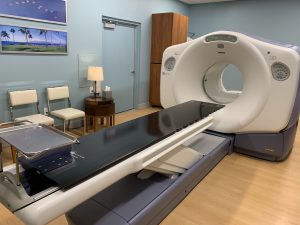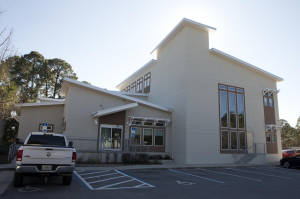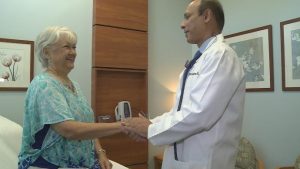Hope Regional Cancer Center Earns ACR Accreditation
Hope Regional Cancer Center, has been awarded the prestigious three-year term of accreditation in radiation oncology as the result of a recent review by the American College of Radiology (ACR). This is the third ACR Accreditation for the Hope Regional Cancer Center (HRCC) and is the only cancer center in the Florida Panhandle to receive this accreditation. Radiation oncology (radiation therapy) is the careful use of high-energy radiation to treat cancer. A radiation oncologist may use radiation to cure cancer or to relieve a cancer patient’s pain.
The ACR seal of accreditation represents the highest level of quality and patient safety. It is awarded only to facilities meeting specific Practice Guidelines and Technical Standards developed by ACR after a peer-review evaluation by board-certified radiation oncologists and medical physicists who are experts in the field. Patient care and treatment, patient safety, personnel qualifications, adequacy of facility equipment, quality control procedures, and quality assurance programs are assessed. The findings are reported to the ACR Committee on Radiation Oncology Accreditation, which subsequently provides the practice with a comprehensive report they can use for continuous practice improvement.
The Hope Regional Cancer Center is dedicated to the treatment of all types of cancer. We provide world class advanced cancer care for each patient in a community setting close to friends, family and home. Our multispecialty, integrated team of board certified cancer experts have been recognized as “Top Doctors” in the areas of radiation oncology and medical oncology/hematology. We understand the importance of customer service toward our patients which explains our 5-star ratings on independent consumer websites such as Vitals and Healthgrades.
Dr. Murshed Publishes New Edition of ‘Fundamentals of Radiation Oncology’ by Elsevier in March 2019
New Book Offers Latest Cancer Treatment Recommendations for Physicians.
- Authors around the World and USA, writes a Cancer Treatment Book to advance Cancer Cure and Care for patients.
- The book is edited by local Cancer Specialist Hasan Murshed, MD.

The field of Cancer management in general, and Radiation Oncology in specific, is rapidly changing. The exciting new techniques such as stereotactic treatments for intra and extra cranial diseases, proton radiation therapy and immunotherapy are only the few of the many, whose importance will increase significantly in the near future for all cancer patient’s treatment. Most notably new clinical studies and their associated data have led to changes in recent understanding and recommendations for cancer treatments, requiring this 3rd edition of Fundamentals of Radiation Oncology.
In his Foreword for the book Dr. Thomas Buchholz, Professor Emeritus, University of Texas, MD Anderson Cancer Center appropriately summarizes “…this text book will help bring forward the many clinical and technical advances in radiation oncology to centers around the world, and in doing so, help raise the standard of care.”
The new edition consists of 26 chapters, divided into four parts: Part I describes the basic science of radiation oncology; Part II describes techniques and modalities of radiation oncology; Part III describes the clinical science of radiation oncology and up to date treatment recommendations; Part IV describes palliative radiation treatments to improve the quality of life for cancer patients.
View / Purchase Book On Amazon.com
Hasan Murshed, MD, MS, earned his medical degree from the University of Dhaka, Bangladesh and his Masters of Science in Medical Physics from Louisiana State University, Baton Rouge, Louisiana. He completed his residency in Radiation Oncology at the University of Alabama – Birmingham. Afterwards he served as a Fellow at the University of Texas, M.D. Anderson Cancer Center, Houston, Texas. Dr. Murshed has been in private practice for more than 15 years and is the Medical Director of Hope Regional Cancer Center, Panama City, FL, USA.
# # #
Hope Regional Cancer Center is Proud to Announce the Availability of a State-Of-The-Art PET/CT Scanner For Our Patients

With an order from the referring physician Hope Regional Cancer Center will now be able to perform the PET/CT for your patients. You will receive prompt interpretations from the trusted and dedicated team of Board-Certified Radiologists from Bay Radiology. You can also be confident that your patients will receive the best care that they deserve from our dedicated staff at the Cancer Center.
Please call our friendly staff at 850-481-1687 today to schedule your patients PET/CT scanning need.
Dr. Hasan Murshed Named “Top Doctor”

The mission of Castle Connolly is to help consumers find the best healthcare. Since 1991, they have been identifying physicians who achieve the best possible health outcomes. Physicians are nominated to be a Top Doctor by their peers. Castle Connolly’s physician-led research team then reviews the credentials of every physician being considered for inclusion, examining among other factors medical education, training, board certification, hospital appointments and professional achievements. Castle Connolly publications of America’s Top Doctors have been recognized by major television media outlets, newspapers and national and regional magazines. For more information visit www.castleconnolly.com.
Dr. Murshed is board certified in radiation oncology. He received his medical degree from Dhaka University. He completed his residency in radiation oncology at the University of Alabama Birmingham and fellowship in IMRT/ Respiratory Gating at world-renowned MD Anderson Cancer Center. He has authored numerous cancer-based publications including Clinical Fundamentals for Radiation Oncologists, a textbook which is currently used in many academic institutions.
Dr. Murshed started Hope Radiation Cancer Center in Lynn Haven in 2012. In 2017, the practice expanded its facility, grew their team of cancer care experts, added new services and changed its name to Hope Regional Cancer Center. In addition to radiation therapy, the practice now also offers precision and targeted chemotherapy, novel drug therapies and treatment of blood disorders. Patients benefit from the ability to consult with several medical specialists in one location regarding their diagnosis and treatment, while not having to worry about transferring medical histories or imaging studies from one provider to the next.
For more information visit www.hoperegionalcancercenter.com
Contact:
Hasan Murshed, M.D.
Medical Director
850-481-1687
Hasan.Murshed@hopercc.com
Hope Cancer Center Expands, Aims for Comprehensive Treatment
LYNN HAVEN — When the Hope Regional Cancer Center opened in 2012, it only offered radiation treatment. Late last year, however, it expanded to offer other services so patients can get more work done under one roof.

“When a cancer patient comes in, many times they require both radiation and chemotherapy,” radiation oncologist Hasan Murshed said. “So in the past what we had to do was do radiation here, and then go for chemotherapy consultation at a different location at a different doctor’s office. Coordination is difficult. The patient is sick. They have to drive around town. They’re elderly people mostly. … From the patient’s perspective, this is much easier.”
The change took place in the mid-September so patients had a “more comprehensive center,” Murshed said. The expansion has always been a vision and desire for the center, finally coming to fruition when had the funding and medical staff to implement it.
“It’s going well,” Murshed said. “Patients are coming in and getting treatment.”
Robert Oldham, the center’s hematologist oncologist, came on several months ago and said the increased services are necessary because Hope’s patients often require surgery and specialists. Hematology deals with blood diseases like iron deficiency and anemia, while oncology deals with several aspects of cancer.
“Cancer is a complex disease,” said Oldham, who previously ran a cancer center in Key West. “I think what Dr. Murshed has done is set the center up so we can match up with those complexities and take care of the whole patient. … I’m glad to be a part of it. It’s very well put together.”
Robert Bloom, the center’s urologist, also has been on-site for the past few months after previously working elsewhere in Panama City. He has practiced medicine throughout the country including in New Orleans, Dallas and Oklahoma.
“It’s very convenient. It’s a new building,” Bloom said. “When I was a resident, the most common cancer in men was lung cancer. Two was colon cancer. Three was prostate cancer. Now the men stop smoking, it’s switched around. The most common cancer for men, except for skin cancer, is prostate cancer. Men are living longer and getting screened for prostate cancer.”
The radiation offered in the same facility is convenient Bloom said, because many prostate cancer patients don’t want to be “cut on” and prefer other treatment.
Along with the numerous specialists a PET scan machine also will be added, likely in March, to replace the center’s current CT scan machine. PET machines have more precise scanning, Murshed said. The center is waiting on the PET machine to be shipped in, and the scan room will be expanded to make space for it.
IMMUNOTHERAPY: New Frontier in Fighting Cancer
Robert Oldham, M.D.
Hasan Murshed, M.D.
Immunotherapy is a treatment that uses the power of your body’s immune system to attack cancer cells. Your immune system is a collection of tissues, organs and cells that work together to protect you from infections and diseases. It can keep track of the substances normally found in your body. New “foreign” substances that the immune system doesn’t recognize cause it to go into self-defense mode to protect you by killing off these invaders.
Cancer cells are foreign to the body. As such, once the immune system recognizes the cancer cells in the blood stream, it then activates the T cells and other immune cells within the lymph nodes. These T cells are then transported to the site of the cancer location, where T cells recognize and kill the cancer cells.
The main types of immunotherapy now being used to treat cancer include:
- Cancer Vaccines: Immune system cells are removed from the patient’s body, which are then sensitized to the cancer cells. The cells are infused back to the patient, which produces immune response to the cancer. Provenge vaccine is now approved for prostate cancer treatment. There are other cancer vaccines under development.
- Monoclonal Antibodies: These are man-made versions of immune system tumor specific proteins that are designed to attack a specific cancer cell. Herceptin is a monoclonal antibody used in treating breast cancer.
- Immune Checkpoint Inhibitors: These drugs alert and activate the immune system so tumor cells have no place to hide from the immune system. Most recently, Keytruda was approved for melanoma treatment and Opdivo was approved for lung cancer treatment.
Immunotherapy is administered through an IV or as a pill. Today, it is being used to treat many different types of cancer including melanoma, breast, lung, gastric, colorectal, cervical, kidney, bladder, prostate and ovarian cancer.
Immunotherapy is a relatively new therapy in the cancer fighting arsenal. It has been found to be effective for certain cancers when other treatments are not. As a combination therapy with other treatments, it may help them to work better. Side effects such as flu-like symptoms, fatigue, rash and dizziness may occur during or after treatment.
Fortunately, the Bay County community now has access to these novel immunotherapies at Hope Regional Cancer Center. If you are diagnosed with a cancer, before undergoing any treatment, you should talk with several cancer specialists to find out which treatment options are appropriate for you.
[Dr. Hasan Murshed and Dr. Robert Oldham are board-certified cancer specialists and consultants at the Bay Medical Regional Cancer Center and at Gulf Coast Medical Center. Reach them at 850-481-1697 or www.HopeRegionalCancerCenter.com. This information is intended for education only. For treatment, seek advice from your physician.]
Specialized cancer radiation treatment reduces side effects and treatment time

“It focuses the radiation beam more accurately and more precisely toward the target,” explains Dr. Murshed.
Patients undergo a CT Scan. That data is put into a supercomputer that helps doctors design a customized treatment plan that shows exactly where the radiation beams should go.
“It can minimize the radiation dose to the skin of the breast cancer patient’s breast surface so we have less skin reaction, less side effects, less pain medication requirement, and they don’t have to break for treatment,” says Dr. Murshed.
IMRT was originally designed for head and neck cancers but is now being used to treat prostate and breast cancers as well.